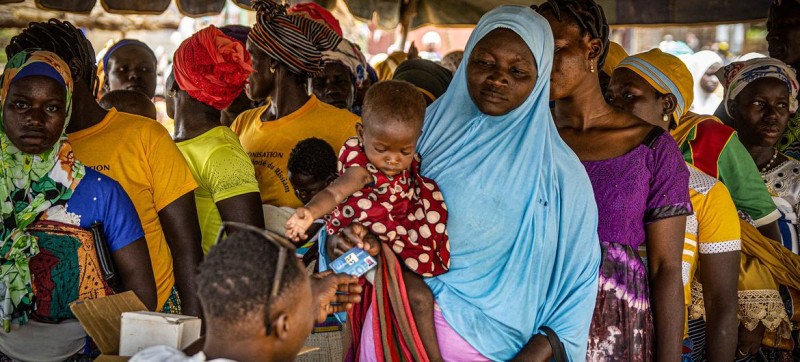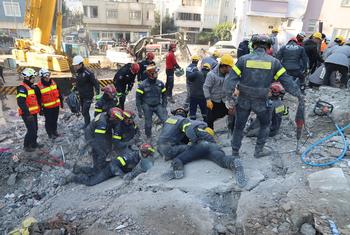
© WFP/Cheick Omar Bandaogo Women line up to receive beneficiary cards to buy fortified flour to prevent malnutrition in Kongoussi, Burkina Faso.
For the first time in the Sahel, 45,000 people are at risk of experiencing catastrophic levels of hunger, or one step away from famine, they said. The majority, 42,000, are in Burkina Faso and Mali, where violent unrest in some areas has hampered the delivery of humanitarian aid.
The combined effects of conflict, climate shocks, the COVID-19 pandemic and high food prices, continue to drive up hunger and malnutrition in the region.
The number of people who do not have regular access to safe and nutritious food is expected to reach 48 million during the lean season from June to August, according to the latest analysis from Cadre Harmonisé, an early warning tool used by humanitarians.
Heart-breaking situation
This represents a fourfold increase in the last five years, and the results further confirm a longer-term trend towards a geographic expansion of food security.
“The spiralling food security and nutrition situation in Western Africa is just heart-breaking,” said Chris Nikoi, Regional Director for the World Food Programme (WFP).
“There is a crucial need for massive investment in strengthening the capacities of communities and individuals to withstand shocks while prioritizing local and long-term solutions to food production, transformation and access for vulnerable groups,” he added.
Child malnutrition rising
WFP alongside the Food and Agriculture Organization (FAO), the UN Children’s Fund (UNICEF) and the UN humanitarian affairs office, OCHA, have renewed their call for greater support to Governments in the region.
The data further showed that 16.5 million children under five are set to face acute malnutrition this year, including nearly five million who are at risk of debilitating severe malnutrition.
Their numbers represent a staggering 83 percent rise in global acute malnutrition compared to the 2015 to 2022 average.
Harder to help now
Conflict and population displacement are also fuelling the crisis, leading to reduced access to essential health, nutrition and water and sanitation services, as well as social protection.
“Growing insecurity and conflict means vulnerability is increasing in the region, and it is getting harder to help communities in isolated areas,” said Marie-Pierre Poirier, Regional Director for the UN Children’s Fund (UNICEF).
Access to food, as well as availability, remain a major concern despite improved rainfall last year.
Trend will worsen
West and Central Africa are dependent on imports, but currency depreciation and high inflation are causing food import bills to rise. The situation is unfolding even as Governments grapple with major fiscal constraints and macroeconomic challenges.
There are also concerns that restrictions on seasonal cattle movements, and high concentrations of livestock in some areas, could lead to further deterioration in pastoral and security conditions.
Robert Guei, FAO’s Sub-regional Coordinator for West Africa, said the continued deterioration of the food and nutrition situation is “unacceptable”.
He added that despite the increase of cereal production, access to food for most people remains challenging as markets have been disrupted because of insecurity and high food prices.
“This trend will probably continue to worsen the food and nutrition situation and therefore we must address the root causes of this crisis in a concerted manner and immediately,” he said. “It is time for action to boost agricultural production to achieve food sovereignty in our region.”
Support regional governments
The UN agencies again appealed to development and humanitarian partners, and the private sector, to step up support to central governments.
“The food and nutrition crisis has a multi-sectoral impact on the living conditions of affected populations in the region, in areas already experiencing humanitarian crises and in all West and Central African countries,” said Charles Bernimolin, Head of OCHA’s office for the region.
“This requires the collective deployment of multisectoral approaches based on the needs expressed by the population putting West and Central Africa people at the centre,” he added.

Türkiye-Syria Earthquake
DONATE!
Emergency and search-and-rescue teams have deployed to assess and prioritize urgent needs and to provide life-saving assistance following the devastating earthquake near the Türkiye-Syria border.

